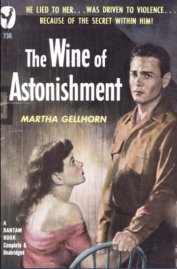The Wine of Astonishment by Martha Gellhorn (1948)
By Taylor Jasmine | On September 28, 2018 | Updated December 24, 2021 | Comments (0)

Martha Gellhorn (1908 – 1998) reported on nearly every global conflict, from the Spanish Civil War to Vietnam, that took place during her 60-year career as a journalist.
She’s considered one of the greatest war correspondents of the twentieth century. It’s a fitting legacy, but she also produced a body of fine fiction. The Wine of Astonishment (1948) is directly inspired by her first-hand experiences as a World War II correspondent.
The protagonist of the novel, Jacob Levy, witnessed the liberation of the Dachau concentration camp, and the shock of the experience changes everything.
The novel examines the horrors of war and the issues of personal responsibility that still resonate today. When the The Wine of Astonishment was first published, it was a New York Times bestseller. It was long out of print, and was reissued in 2016 as The Point of No Return in paperback and as an e-book.
A 1948 review of The Wine of Astonishment
The Feminine View on War, a review of The Wine of Astonishment by Martha Gellhorn in The Daily Oklahoman, November 7, 1948: Until World War II, women were generally denied the experience for writing intimately and authentically of men in battle. That this is no longer true is shown in Martha Gellhorn’s novel about soldiers during the Battle of the Bulge and the Allied drive into Germany.
Miss Gellhorn’s book is written against a background of nine years observance of war as a correspondent covering the war in Spain, the Russo-Finish war, the Sino-Japanese war before Pearl Harbor, World War II in Europe, and lastly the post-war fighting in Java.
In her account of soldiers, Miss Gellhorn can be as tough minded as the early Dos Passos or Norman Mailer or as tender as Ernest Hemingway in his love story placed in a battle setting in A Farewell to Arms. In fact, Miss Gellhorn merits comparison on the individuality of her characters and in her softly modulated style.
. . . . . . . . . .
Point of No Return (first published as The Wine of Astonishment)
is now available as an e-book on Amazon*
. . . . . . . . . .
This novel, beginning with the fighting in Belgium, focuses on two soldier-characters — Lieutenant Colonel Smithers, a Georgian who is a battalion commander, and his jeep driver, Jacob Levy, a handsome Jewish boy from St. Louis. In Luxembourg for a two-week rest period.
Smithers seeks love and an understanding of the meaning of human existence in an affair with a disillusioned Red Cross girl; and Levy finds what Smithers fails to discover in his love for a gentle and lovely country girl.
The novel reaches a climax in an unreasonable act of violence committed by Levy after a visit to the Dachau crematory, when he first realizes the horror and magnitude of Nazi repudiation of humanity.
Miss Gellhorn’s handling of her interrelated themes is skillful, her characterization is understanding and believable, and her prose style is flexible and perceptive. The Wine of Astonishment is certainly one of the best novels of World War II.
. . . . . . . . . .
See also: The Trouble I’ve Seen by Martha Gellhorn (1936)
. . . . . . . . . .
The New York Times‘ 1948 review titled “Taut, Tender, Tough” began by doing something that Martha always loathed — comparing her writing with that of Ernest Hemingway, her ex-husband. But it was laudatory on its own terms, concluding:
“Memorable … are her pictures of men at the front, on leave, at parties, in the rubbled towns of Germany and amid its fat, prosperous looking farms. In her scenes of action she achieves those two contradictory parts of the military whole: she pins down the irreducible incident with perfect lucidity at the same time that she conveys an impression of battle-blurring confusion.Miss Gellhorn’s talent were never better exhibited than in this humanly penetrating novel of war.”
Read the New York Times‘ full review of The Wine of Astonishment.
. . . . . . . . . .
*This is an Amazon Affiliate link. If a product is purchased by linking through, Literary Ladies Guide receives a modest commission, which helps maintain our site and helps it to continue growing!


Leave a Reply